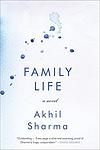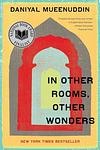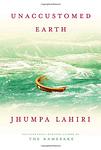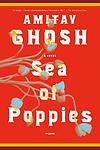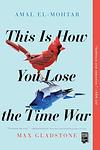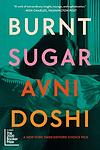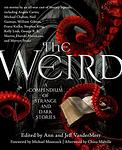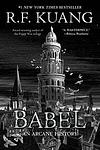The Greatest Indian, Multiple "Fiction" Books Since 2000
Click to learn how this list is calculated.
This list represents a comprehensive and trusted collection of the greatest books. Developed through a specialized algorithm, it brings together 300 'best of' book lists to form a definitive guide to the world's most acclaimed books. For those interested in how these books are chosen, additional details can be found on the rankings page.
Genres
Countries
Date Range
Reading Statistics
Click the button below to see how many of these books you've read!
Download
If you're interested in downloading this list as a CSV file for use in a spreadsheet application, you can easily do so by clicking the button below. Please note that to ensure a manageable file size and faster download, the CSV will include details for only the first 500 books.
Download-
1. The White Tiger by Aravind Adiga
"The White Tiger" is a darkly humorous novel set in modern-day India that explores the country's class struggle through the eyes of an ambitious and cunning protagonist. Born in a poor village, he moves to Delhi to work as a chauffeur for a rich family. He eventually breaks free from his life of servitude by committing an act of shocking violence, and uses his newfound freedom to become a successful entrepreneur in Bangalore. The story, told through a series of letters written to the Chinese Premier, is a scathing critique of India's social and economic disparities, and the corruption that permeates all levels of society.
-
2. The Inheritance of Loss by Kiran Desai
This novel explores themes of love, loss, and the human struggle for identity amidst political unrest. Set in India during the Nepalese movement for an independent state, the narrative follows the lives of a retired judge living in the Himalayas, his granddaughter, and his cook. As the political situation worsens, each character must grapple with their own personal issues, including the judge's regret over his failed marriage and his granddaughter's struggle to find her place in the world. The cook, meanwhile, dreams of a better life for his son in the United States. The narrative weaves together these individual stories to create a poignant tapestry of human resilience in the face of adversity.
-
3. Family Life by Akhil Sharma
Family Life is a poignant, semi-autobiographical novel that follows the experiences of an Indian family that immigrates to America in the late 1970s. Their dream of a better life is shattered when the older son suffers a terrible accident that leaves him brain-damaged. The story is narrated by the younger son, who struggles with the pressures of his parents' expectations, the trauma of his brother's condition, and the cultural dislocation of being an immigrant in America. The novel explores themes of family, love, loss, and the immigrant experience.
-
4. La Charte Du Mandé Et Autres Traditions Du Mali by Aboubakar Fofana, Jean-Louis Sagot
"La Charte Du Mandé Et Autres Traditions Du Mali" is a comprehensive exploration of the rich historical and cultural heritage of Mali, focusing on the ancient Mandé Charter, also known as the Manden Charter. This seminal text delves into the origins and implications of this 13th-century document, which is one of the earliest forms of human rights charters. The book not only examines the charter's principles of social justice, equality, and political ethics but also contextualizes it within a broader spectrum of Malian traditions, shedding light on the country's profound historical narratives and the enduring cultural practices that continue to shape its identity.
-
5. In Other Rooms, Other Wonders by Daniyal Mueenuddin
"In Other Rooms, Other Wonders" is a collection of interconnected short stories that delve into the lives of various characters connected to a wealthy landowner in Punjab, Pakistan. The narrative spans different levels of society, from the landowner himself to his managers, servants, and peasants, weaving a tapestry of tales that reveal the complexities of power, influence, and relationships in Pakistani society. Each story explores themes of love, betrayal, and social mobility, offering a poignant look at the struggles and aspirations of individuals trying to navigate a world governed by tradition and changing socio-economic landscapes.
-
6. Unaccustomed Earth by Jhumpa Lahiri
"Unaccustomed Earth" is a collection of short stories by Jhumpa Lahiri that explores the lives of Bengali immigrants and their children in the United States. The stories focus on themes of family, love, loss, and cultural identity as characters navigate the challenges of assimilation and the tensions between their American and Bengali identities. The collection is divided into two parts, with the first featuring interconnected stories about the experiences of two generations of a Bengali family, and the second featuring standalone stories that explore similar themes. Overall, the book offers a nuanced and poignant portrayal of the immigrant experience and the complexities of cultural identity.
-
7. Sea of Poppies by Amitav Ghosh
"Sea of Poppies" is a historical novel set in the 1830s, just before the Opium Wars. It traces the intertwined lives of a diverse group of characters, from a raja turned convict, a widowed poppy grower, a French orphan, to a mulatto American freedman, all of whom are brought together on the Ibis, a former slave ship now used for transporting opium. The story explores the social and economic impact of the opium trade, colonialism, and the caste system, while also delving into the personal histories, relationships, and struggles of the characters.
-
8. Q & A by Vikas Swarup
The book is a gripping tale of a young Indian waiter who becomes the biggest quiz show winner in history, only to be arrested for cheating. Through a series of flashbacks and heart-wrenching stories, we learn how his life experiences provided him with the answers to the show's questions. Each chapter reveals a different episode of his past, from his childhood in the slums to various encounters that taught him lessons about love, betrayal, and survival, painting a vivid portrait of the struggle and resilience of life in contemporary India.
-
9. Japanese Philosophy by John C. Maraldo, Thomas P. Kasulis, James W. Heisig
This book provides a comprehensive overview of Japanese philosophy, exploring its unique characteristics and its evolution through history. It delves into the diverse intellectual traditions of Japan, including both well-known philosophical schools and lesser-known but equally significant ideas. The text examines how Japanese philosophy has been influenced by and has interacted with other philosophical traditions, particularly Western philosophy, while also highlighting its distinct approach to fundamental philosophical issues such as ethics, aesthetics, and the nature of reality. Through a detailed analysis, the book offers insights into how Japanese philosophical thought has contributed to broader philosophical discourse and how it reflects the cultural and historical context of Japan.
-
10. The Philosophical Works Of Al Kindi by Peter E. Pormann, Peter Adamson
This book is a comprehensive compilation and analysis of the works of Al-Kindi, often regarded as the first of the Muslim peripatetic philosophers. The text delves into Al-Kindi's extensive contributions to various fields of knowledge, including philosophy, mathematics, astronomy, and medicine, highlighting his role as a pivotal figure in the translation and transmission of ancient Greek philosophy to the Islamic world. Through translations of his works and insightful commentary, the book provides a critical exploration of Al-Kindi's synthesis of philosophical thought and his influence on subsequent Islamic and Western intellectual traditions.
-
11. This Is How You Lose The Time War by Amal El Mohtar, Max Gladstone
In this epistolary science fiction novel, two rival agents, Red and Blue, find themselves on opposite sides of a sprawling temporal conflict known as the Time War. As they carry out missions to manipulate the strands of history for their respective factions, their paths cross in unexpected ways. Through a series of secret letters left across time and space, what begins as taunting correspondence evolves into a deep, forbidden connection. The narrative weaves a complex tapestry of time-travel and intrigue, exploring themes of love, identity, and the consequences of actions within the ever-shifting sands of time. As their bond deepens, Red and Blue must ultimately decide where their loyalties lie and what sacrifices they are willing to make for a chance at a future together.
-
12. Burnt Sugar by Avni Doshi
This novel delves into the complex and fraught relationship between a mother and daughter against the backdrop of contemporary India. The daughter, now an adult, grapples with her mother's advancing dementia and the bitter memories of a childhood marked by neglect and unconventional parenting. As the mother's memory deteriorates, the daughter is forced to confront the painful legacy of their past and the ambiguity of her filial obligations. The narrative weaves through themes of memory, betrayal, and the inextricable bond of family, painting a portrait of two women bound by love and resentment in equal measure.
-
13. The Association Of Small Bombs by Karan Mahajan
"The Association of Small Bombs" by Karan Mahajan is a novel that explores the aftermath of a bomb blast in Delhi, India. The story follows the lives of two families affected by the tragedy, as well as the bomber himself. Through their perspectives, the novel delves into themes of grief, revenge, and the complexities of terrorism. Mahajan's writing is both intimate and expansive, offering a nuanced portrayal of the human impact of violence.
-
14. Ghachar Ghochar by Vivek Shanbhag
"Ghachar Ghochar" is a compelling novella that explores the dynamics of a close-knit Indian family whose lives change dramatically after a sudden financial windfall. The story, narrated by an unnamed protagonist, examines the moral and emotional complexities that arise from their newfound wealth, leading to tension, corruption, and a disintegration of their former values. The title, a nonsense phrase coined by the family, symbolizes the tangled mess their lives have become - a situation so complicated that it's beyond any solution.
-
15. Djinn Patrol On The Purple Line by Deepa Anappara
Set in a sprawling slum in India, this novel follows nine-year-old Jai and his friends as they embark on a quest to find a missing classmate. As children in their community continue to disappear, Jai takes it upon himself to become a detective, determined to uncover the truth. Faced with poverty, corruption, and a society that disregards their plight, Jai and his friends navigate the complexities of their surroundings while grappling with their own fears and dreams. Through their eyes, the book explores themes of innocence, resilience, and the harsh realities of life in a marginalized community.
-
16. The Weird by Ann VanderMeer
"The Weird" is a comprehensive anthology that delves into the strange and uncanny realms of speculative fiction, featuring a diverse collection of stories spanning over a century. This tome curates a wide array of tales from various authors around the world, each contributing their unique voice to the genre of weird fiction. The stories within its pages explore the eerie, the surreal, and the bizarre, often blurring the lines between reality and the fantastical. The anthology serves as both a celebration of the genre's rich history and an introduction to its most compelling voices, offering readers a labyrinthine journey through the many facets of weird literature.
-
17. Only The Longest Threads by Tasneem Zehra Husain
"Only The Longest Threads" is a novel that creatively explores the evolution of major scientific theories through the eyes of fictional characters who experience these paradigm shifts firsthand. Each narrative thread is woven around pivotal moments in the history of physics, such as the formulation of classical mechanics, electromagnetism, general relativity, quantum mechanics, and string theory. The characters, ranging from a scribe during Newton's era to a modern-day graduate student, provide personal and often poetic insights into the intellectual and emotional upheavals brought about by groundbreaking discoveries. Through their interconnected stories, the book illustrates the deeply human endeavor of scientific inquiry and the relentless pursuit of understanding the universe.
-
18. The Glass Palace by Amitav Ghosh
"The Glass Palace" is a sweeping historical epic that spans over a century, tracing the tumultuous events of the British invasion of Burma and its aftermath. The story follows the life of Rajkumar, an Indian orphan, who rises from the depths of poverty to become a wealthy businessman. His journey is intricately linked with the fates of those around him, including Dolly, a maid in the royal palace, and a host of other characters whose lives intersect across the landscapes of Burma, India, and Malaya. The novel explores themes of love, loyalty, and the impacts of colonialism, while providing a deep insight into the historical and political complexities of the Southeast Asian region.
-
19. Babel by R. F. Kuang
This novel is a dark academic fantasy set in an alternate 19th-century Oxford, where translation is the key to harnessing magical power. It follows the journey of an orphan from Canton, who, after a tragic loss, is brought to England and later admitted into the prestigious Royal Institute of Translation, known as Babel. There, he discovers the true cost of the empire's linguistic dominance and magical control. As tensions rise and loyalties are tested, the protagonist must navigate a complex web of colonialism, power, and rebellion, ultimately confronting the oppressive structures of the institute and the empire it serves. The narrative weaves together themes of language, knowledge, and resistance, challenging the foundations of power and the price of progress.
-
20. The Imperfectionists by Tom Rachman
The book is a poignant and humorous collection of interconnected stories that revolve around the staff of an English-language international newspaper based in Rome. It delves into the personal and professional lives of the reporters, editors, and executives who are struggling to keep the paper—and their own lives—afloat amidst the changing landscape of journalism. Each chapter focuses on a different character, painting a vivid portrait of the quirky and flawed individuals behind the headlines, while subtly weaving in themes of love, ambition, and the relentless march of technological change. The narrative captures the bittersweet reality of the imperfections that define us all, set against the backdrop of the declining newspaper industry.
-
21. Osama by Lavie Tidhar
In this genre-blending novel, a private detective is drawn into a surreal world where pulp fiction and reality intertwine. Tasked with finding a mysterious woman who appears in countless books and films, the detective's journey takes him across a fragmented landscape, where he encounters alternate versions of historical events and figures. As he delves deeper, the boundaries between his own existence and the fictional world of a notorious terrorist begin to blur, leading to a haunting exploration of identity, myth, and the nature of truth.
Reading Statistics
Click the button below to see how many of these books you've read!
Download
If you're interested in downloading this list as a CSV file for use in a spreadsheet application, you can easily do so by clicking the button below. Please note that to ensure a manageable file size and faster download, the CSV will include details for only the first 500 books.
Download

